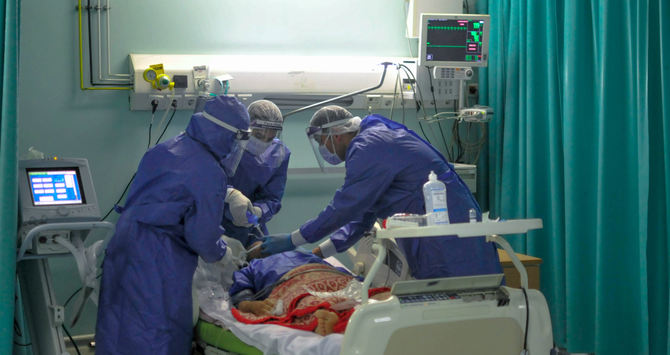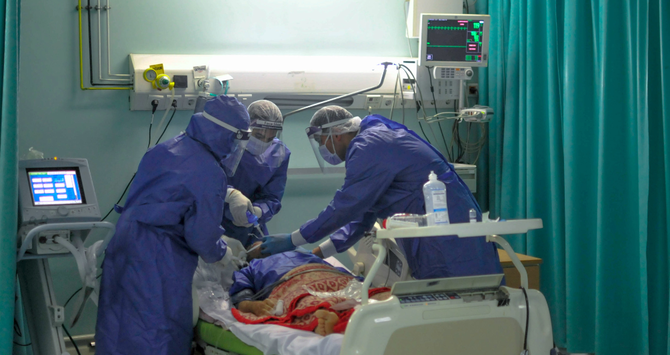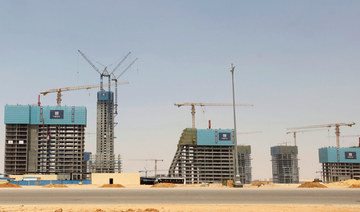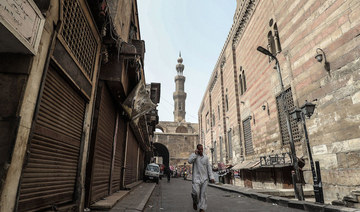Cairo: An Egyptian dad who posted a video on social media claiming the coronavirus disease (COVID-19) outbreak was fake news has died after contracting the virus.
Tourism worker Mohamed Wahdan, 29, failed to heed World Health Organization and Egyptian Ministry of Health warnings about the global threat posed by COVID-19, dismissing it on Facebook as a story fabricated by the US to damage the Chinese economy.
In his post on March 16, Wahdan, who lived with his wife and daughter in the Munefeya governorate north of Cairo, urged his fellow Egyptians to carry on with their lives as normal. He also criticized food hoarders and the closure of gyms while acknowledging the need to take precautionary measures against COVID-19.
However, soon after downplaying the seriousness of the virus, he started showing symptoms and was admitted to an isolation hospital south of Cairo after testing positive for COVID-19. By that time, he had already infected his brother and father with the virus.
Two days after being taken into hospital Wahdan’s health started to deteriorate but when he was able, he posted videos on his Facebook page admitting his mistakes, explaining the serious nature of the virus, and calling on people to stay at home.
“I was told to stay at home and not to go out, but I didn’t take such warnings seriously as I was pursuing a false life,” he said. “Please do not take the virus lightly because it is a fatal disease that destroys every part of your body.
“Hunger will not kill you. Do not risk your life. The disease is spreading in Egypt especially in Munefeya. Unfortunately, my siblings contracted the virus from me. Stay in your homes because this is a lethal disease. Please kindly pray for me from your hearts that I be cured soon of the virus. God bless you all.”
In Wahdan’s last post before he died, he could barely talk. His friends announced his death on Tuesday and his funeral was held in his home village of Taha Shobra.
On May 4, after his father had tested positive for COVID-19, Wahdan took to Facebook and said: “Please pray for my father Nady Wahdan who is currently in the chest hospital, because he has coronavirus. He is in bad shape. Please, God, help us through this. I wonder who will be next?”
After becoming infected himself, Wahdan started posting online videos from the quarantine hospital, despite sometimes being unable to talk due to fever, to document his suffering and warn others of the dangers of the disease. In one, just before his death, he said: “I am dying.”
A friend of Wahdan described him as an athlete and someone who always enjoyed good health. The pal, who wished to remain anonymous, told Arab News that Wahdan’s father was in hospital in the city of Shebein El-Kom and his brother, Bahaa, was receiving treatment elsewhere. He said both were in a stable condition but had not been told about Wahdan’s death.
Mohamed Allam, vice chairman of an isolation hospital in the Egyptian city of Matrouh, said the fear and panic Wahdan had shown in some of his posts, were due to the constant pain and fever he had been experiencing.
On Facebook, Allam said: “This does not necessarily happen to everyone. In a few cases the pain is extreme, and the fever goes on for days causing much more pain in the body and affecting a patient’s state of mind. Panic in such cases will not make things any better.
“No one should face the beginning of the disease while in a state of surrender thinking that they will eventually die. Only God knows when we will die. There are very high rates of recovery. Of course, the disease has defeated some people but still, they are few.”


























